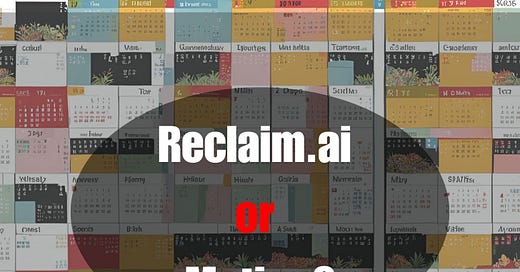Reclaim.ai vs. Motion: Which AI Calendar Fits Your Workflow Best?
Having explored Reclaim.ai and Motion, I've identified key differences that might influence your choice.
Highlights
AI Calendar Showdown: Compare Reclaim.ai and Motion's features and benefits.
Productivity vs. Balance: Find out which AI calendar suits your work style.
User Insights: Get real user reviews and pros and cons.
As the trend of AI calendars rises across industries, Google has taken a user-friendly approach to its leadership position. The integratio…
Keep reading with a 7-day free trial
Subscribe to 24Hour Journal to keep reading this post and get 7 days of free access to the full post archives.




